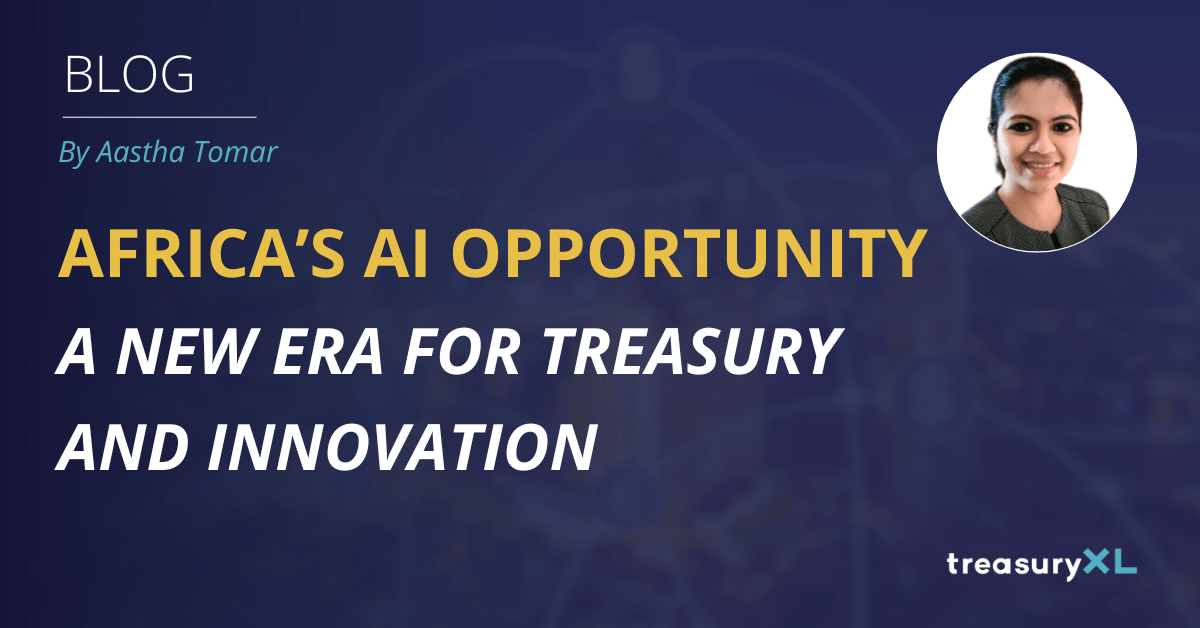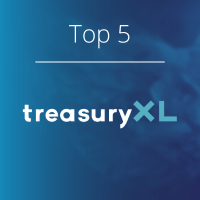Africa’s AI Opportunity: A New Era for Treasury and Innovation
By Aastha Tomar
There’s something electric about Africa right now.

Maybe it’s the energy of the continent’s youth, Africa is home to the youngest population in the world. But it’s more than that. It’s the hope, the optimism, and the deep desire to make a meaningful difference in people’s lives.
Over the past year, I’ve met so many inspiring individuals who’ve returned to Africa after living abroad. Each one came back with a mission: to contribute to the continent’s growth. And what’s striking is their unwavering belief that they will succeed.
In today’s tech-driven world, Africa’s youthful population gives it a unique edge not just to adopt artificial intelligence, but to lead its development. With 18% of the global population, the continent has the potential to rally around a shared vision for inclusive, impactful AI.
A major milestone came in April 2025, when 49 African nations signed the Africa Declaration on Artificial Intelligence in Kigali. This landmark agreement is more than just words it’s a commitment to using AI as a catalyst for economic transformation, with treasury and finance at the core.
Here are just a few examples of how that transformation is already taking shape:
1. As of June 2025, 159 African startups have raised over $803 million in funding.
2. In Kenya, iCow uses AI to send farming tips via SMS, helping smallholder farmers boost productivity.
3. Aerobotics in South Africa leverages AI with drone and satellite imagery to optimize crop management making it one of Africa’s top agri-tech exports.
4. Rwanda’s national digitization strategy is integrating AI across government services, healthcare, and education.
It’s exciting to see treasury teams across Africa stepping into strategic leadership roles. With tools like AI-powered forecasting, real-time liquidity management, and embedded finance platforms, they’re helping organizations leapfrog outdated systems and build smarter, more agile financial ecosystems.
Some key highlights from the Africa AI Declaration:
1. A $60 billion Africa AI Fund to support infrastructure, research, and deployment.
2. A commitment to ethical, inclusive, and trustworthy AI.
3. Support for real-time payments, digital ID systems, and AI-driven debt modeling.
This isn’t just policy—it’s a blueprint for resilience, inclusion, and innovation. Treasury leaders, fintech pioneers, and governments now share a powerful mandate: to use AI as a tool for empowerment and transformation.
Africa isn’t just catching up—it’s shaping the future of AI.
Can’t get enough? Check out these latest items
 https://treasuryxl.com/wp-content/uploads/2025/11/Aastha-blog.png
200
200
treasuryXL
https://treasuryxl.com/wp-content/uploads/2018/07/treasuryXL-logo-300x56.png
treasuryXL2026-02-16 07:00:142026-02-13 15:38:01MiCA turns crypto from a “use case” into a treasury risk decision.
https://treasuryxl.com/wp-content/uploads/2025/11/Aastha-blog.png
200
200
treasuryXL
https://treasuryxl.com/wp-content/uploads/2018/07/treasuryXL-logo-300x56.png
treasuryXL2026-02-16 07:00:142026-02-13 15:38:01MiCA turns crypto from a “use case” into a treasury risk decision. https://treasuryxl.com/wp-content/uploads/2025/11/Aastha-blog.png
200
200
treasuryXL
https://treasuryxl.com/wp-content/uploads/2018/07/treasuryXL-logo-300x56.png
treasuryXL2026-01-28 07:00:072026-01-27 15:49:35GENIUS Act: A Treasurer’s Perspective on Stable coins
https://treasuryxl.com/wp-content/uploads/2025/11/Aastha-blog.png
200
200
treasuryXL
https://treasuryxl.com/wp-content/uploads/2018/07/treasuryXL-logo-300x56.png
treasuryXL2026-01-28 07:00:072026-01-27 15:49:35GENIUS Act: A Treasurer’s Perspective on Stable coins https://treasuryxl.com/wp-content/uploads/2025/11/Aastha-blog.png
200
200
treasuryXL
https://treasuryxl.com/wp-content/uploads/2018/07/treasuryXL-logo-300x56.png
treasuryXL2025-11-27 07:00:432025-11-26 09:39:58Africa’s Critical Minerals Boom and What It Means for Treasury
https://treasuryxl.com/wp-content/uploads/2025/11/Aastha-blog.png
200
200
treasuryXL
https://treasuryxl.com/wp-content/uploads/2018/07/treasuryXL-logo-300x56.png
treasuryXL2025-11-27 07:00:432025-11-26 09:39:58Africa’s Critical Minerals Boom and What It Means for Treasury https://treasuryxl.com/wp-content/uploads/2025/11/Aastha-blog.png
200
200
treasuryXL
https://treasuryxl.com/wp-content/uploads/2018/07/treasuryXL-logo-300x56.png
treasuryXL2025-11-10 07:00:572025-11-07 16:53:27Africa’s AI Opportunity: A New Era for Treasury and Innovation
https://treasuryxl.com/wp-content/uploads/2025/11/Aastha-blog.png
200
200
treasuryXL
https://treasuryxl.com/wp-content/uploads/2018/07/treasuryXL-logo-300x56.png
treasuryXL2025-11-10 07:00:572025-11-07 16:53:27Africa’s AI Opportunity: A New Era for Treasury and Innovation https://treasuryxl.com/wp-content/uploads/2024/12/Treasury-Chests-Featured.png
200
200
treasuryXL
https://treasuryxl.com/wp-content/uploads/2018/07/treasuryXL-logo-300x56.png
treasuryXL2024-12-24 07:00:362025-07-14 09:07:49Opening Treasury Chests!
https://treasuryxl.com/wp-content/uploads/2024/12/Treasury-Chests-Featured.png
200
200
treasuryXL
https://treasuryxl.com/wp-content/uploads/2018/07/treasuryXL-logo-300x56.png
treasuryXL2024-12-24 07:00:362025-07-14 09:07:49Opening Treasury Chests! https://treasuryxl.com/wp-content/uploads/2024/01/Kopie-van-Poll-tXL.png
200
200
treasuryXL
https://treasuryxl.com/wp-content/uploads/2018/07/treasuryXL-logo-300x56.png
treasuryXL2024-01-11 07:00:482025-07-14 09:07:45The Top 5 Most Popular Articles of 2023 on treasuryXL!
https://treasuryxl.com/wp-content/uploads/2024/01/Kopie-van-Poll-tXL.png
200
200
treasuryXL
https://treasuryxl.com/wp-content/uploads/2018/07/treasuryXL-logo-300x56.png
treasuryXL2024-01-11 07:00:482025-07-14 09:07:45The Top 5 Most Popular Articles of 2023 on treasuryXL! https://treasuryxl.com/wp-content/uploads/2023/02/aastha-blog-200x200-1.png
200
200
treasuryXL
https://treasuryxl.com/wp-content/uploads/2018/07/treasuryXL-logo-300x56.png
treasuryXL2023-02-23 07:00:152024-12-10 10:52:45What is Treasury in Banking?
https://treasuryxl.com/wp-content/uploads/2023/02/aastha-blog-200x200-1.png
200
200
treasuryXL
https://treasuryxl.com/wp-content/uploads/2018/07/treasuryXL-logo-300x56.png
treasuryXL2023-02-23 07:00:152024-12-10 10:52:45What is Treasury in Banking? https://treasuryxl.com/wp-content/uploads/2020/12/singapore-city-skyline-5k-kb-2048x1152-1.jpg
1152
2048
treasuryXL
https://treasuryxl.com/wp-content/uploads/2018/07/treasuryXL-logo-300x56.png
treasuryXL2020-12-31 07:00:282021-12-28 12:21:33Top 5 most read articles at treasuryXL.com and LinkedIn of 2020
https://treasuryxl.com/wp-content/uploads/2020/12/singapore-city-skyline-5k-kb-2048x1152-1.jpg
1152
2048
treasuryXL
https://treasuryxl.com/wp-content/uploads/2018/07/treasuryXL-logo-300x56.png
treasuryXL2020-12-31 07:00:282021-12-28 12:21:33Top 5 most read articles at treasuryXL.com and LinkedIn of 2020 https://treasuryxl.com/wp-content/uploads/2020/08/Recap-Interview.png
200
200
treasuryXL
https://treasuryxl.com/wp-content/uploads/2018/07/treasuryXL-logo-300x56.png
treasuryXL2020-08-04 07:00:182022-12-28 10:26:03Recap of the first ‘Meet the Expert’ interview series and full overview
https://treasuryxl.com/wp-content/uploads/2020/08/Recap-Interview.png
200
200
treasuryXL
https://treasuryxl.com/wp-content/uploads/2018/07/treasuryXL-logo-300x56.png
treasuryXL2020-08-04 07:00:182022-12-28 10:26:03Recap of the first ‘Meet the Expert’ interview series and full overview



